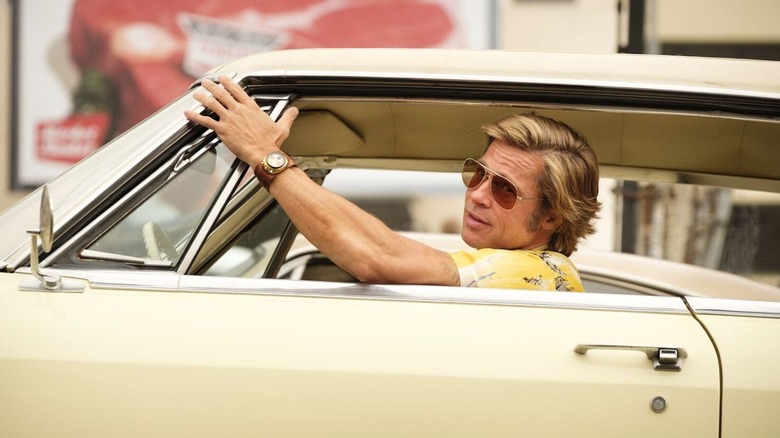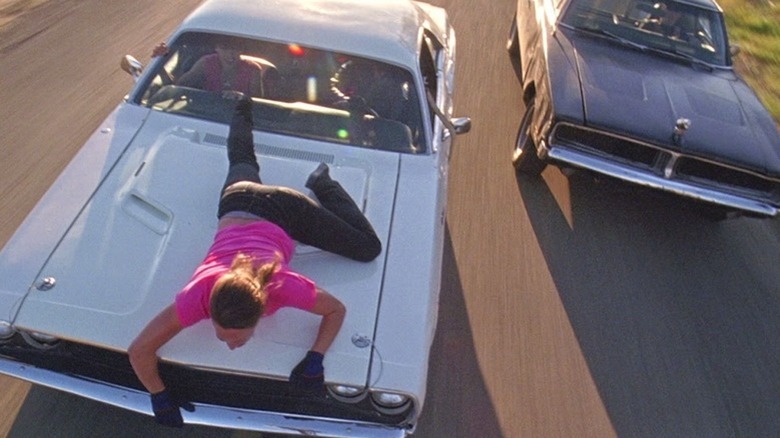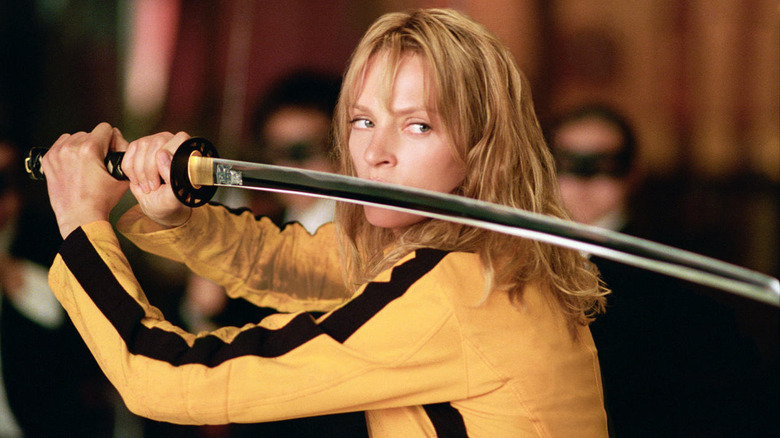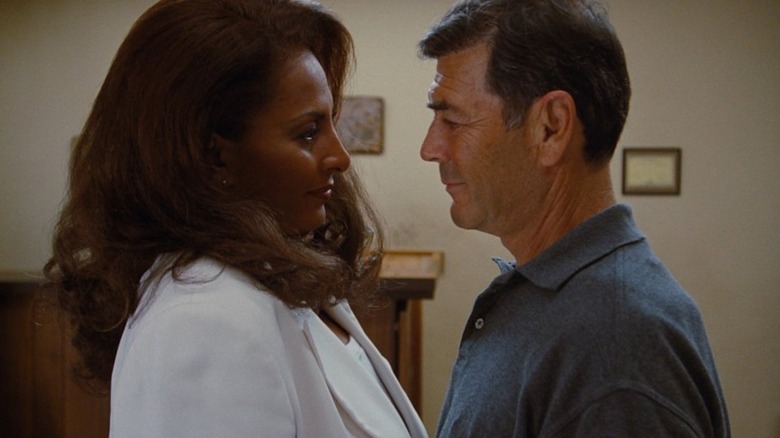Quentin Tarantino Just Called Once Upon A Time In Hollywood His Best Movie
Asking a filmmaker to name their favorite movie tends to be a dead-end line of inquiry. Directors don't see their films the same way we do. They can't. They spent months to a year or more piecing the work together. They've seen it in fragments, as a rough assemblage, and in various other incarnations. Some directors don't even watch their movies with an audience. They finish and move on to the next one.
Quentin Tarantino, however, is a different breed. When he's not making a movie, he's watching movies. When he's making a movie, he's watching movies. He is acutely aware of where his movies land in the continuum of film history and loves to pontificate as to how his run measures up to the oeuvres of greats like Howard Hawks and Brian De Palma. So when you ask him to name his favorite movie, you can rest assured that he has given his answer a great deal of thought. And because you are not Quentin Tarantino, you should feel to disagree — especially when he's wrong, as he was recently on The Howard Stern Show.
Separating the lesser Tarantino entries from the triumphs
While promoting his fascinating book "Cinema Speculation," which might be the most provocative collection of film criticism since Pauline Kael surrendered her sword, Tarantino dropped by the candid radio host's show to stir up trouble. Stern kicked off their chat by asking Tarantino which of his films is his favorite. "For years people used to ask me stuff like that," he said. "And I would say something like, 'Oh, they're all my children.'" But then he delivered a definitive answer. "I really do think 'Once Upon a Time in Hollywood' is my best movie."
There isn't a great gulf of quality between Tarantino's best film and his worst. Most people hold that "Death Proof," in either its truncated "Grindhouse" form or 127-minute standalone cut, is his weakest movie, but I'm not sure I agree. At three hours, "The Hateful Eight" is a distended, thematically uncertain riff on Sergio Corbucci's "The Great Silence." It's specifically referential. There's a smattering of John Carpenter's "The Thing" in the mix, but Tarantino never shakes the specter of Corbucci's snowbound masterpiece, which boasts one of the bleakest conclusions in film history.
It's worth noting that Tarantino's screenplays often get leaked to the internet ahead of production, and he typically shrugs it off. When the "Hateful Eight" script turned up online, he threw a bonafide hissy. I think this was because the script needed more time in the oven, or to not get made at all. At least "Death Proof" is defiantly its own thing. The "final girl" noodling feels ported over from Carol J. Clover's "Men, Women, and Chainsaws: Gender in the Modern Horror Film," but at least he paves over his undernourished conclusion with a spectacular car chase. It's an invigoratingly feminist work.
A grindhouse adherent with a deep sentimental streak
As to his best movie, there are four titles that I believe are in play: "Pulp Fiction," "Jackie Brown," "Kill Bill: The Whole Bloody Affair," and "Once Upon a Time in Hollywood." I suspect there are rights issues with Miramax keeping Tarantino from releasing "Kill Bill" in its full, unexpurgated glory, because, having seen this cut at Tarantino's New Beverly Cinema in West Hollywood, it is clearly the definitive version. We are supposed to learn that The Bride's daughter is still alive at the moment it is revealed to her. Tarantino was commercially wise to capitulate to Harvey Weinstein's insistence on two volumes, but by giving away that late twist, he compromised a masterpiece.
"Pulp Fiction?" It's a perfect movie, but cold around the heart. I prefer Tarantino the sentimentalist, and he's still too much the eager-to-impress video store brat here.
"Once Upon a Time in Hollywood" is a cinephilic feast. After 15 years in the city, Tarantino's Los Angeles was achingly familiar to me. That third-act montage scored to The Rolling Stones' "Metamorphosis" variation on "Out of Time" made me homesick for a place I'd left abruptly under tremendous duress. It was the prelude to a prayer for a 1970s devoid of curdled, Manson Family hippie horses***, where a scuffling star like Rick Dalton could've found a home in the New Hollywood firmament. It's a lovely fantasy.
I'll send you a postcard
But "Jackie Brown" is how life works out more often than not. It's a lonely-heart yarn about a bibliophile bail bondsman who falls for a gun-running flight attendant. Okay, that's not your life specifically, but the affectionate relationship that develops between two middle-aged cogs in the capitalistic wheel was wise beyond Tarantino's 34 years at the time. That's real, and it slices your heart wide open like Hanzō steel. He took Elmore Leonard's "Rum Punch," and crafted a film that expands upon the author's brisk 297-page novel.
Tarantino generally takes great pains to draw out his characters' quirks, but there is still nothing in his filmography that compares to the complex, melancholy interactions between Max Cherry (Robert Forster) and Jackie Brown (Pam Grier). Since the wouldn't-it-be-nice fantasy of "Inglourious Basterds," Tarantino has been peddling celluloid fantasies wherein Nazis and bigots and brainwashed hippies reap the whirlwind. I dig it, but we're never going to live in that world. I do, however, know what it's like to drive through Hollywood singing forlornly along to Bobby Womack's "Across 110th Street." It doesn't feel great, but I treasure the commiseration.



